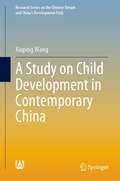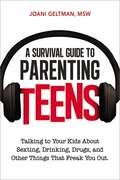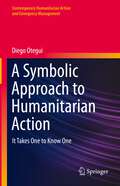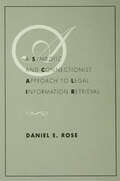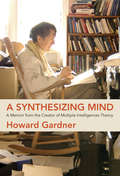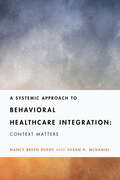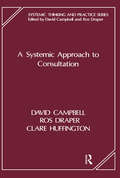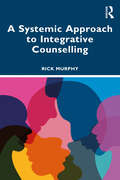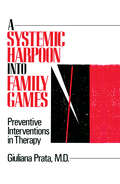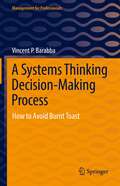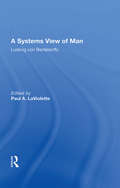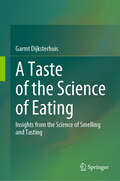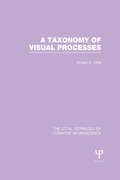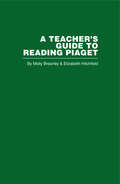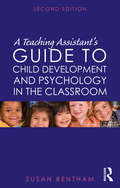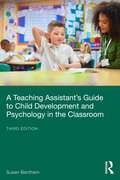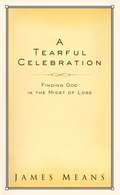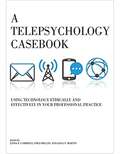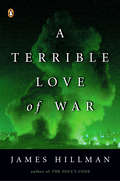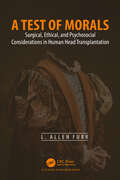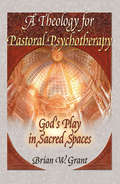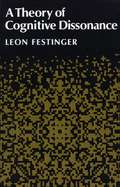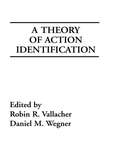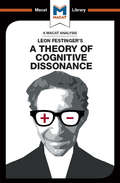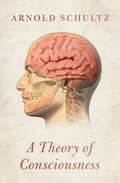- Table View
- List View
A Study on Child Development in Contemporary China (Research Series on the Chinese Dream and China’s Development Path)
by Xiuping WangThis book is devoted to the description and analysis of child population, rights to survival and development, culture and policies that Chinese government made in contemporary China. The book pursues three major objectives: firstly, to objectively describe child development in contemporary China ; secondly, to analyze characteristics of child development in contemporary China; and thirdly, to review all types of policies Chinese government has made on children survival, protection and development, which played important roles on promoting child development.
A Survival Guide to Parenting Teens: Talking to Your Kids About Sexting, Drinking, Drugs, adn Other Things That Freak You Out
by Joani GeltmanThe teenage years will bring problems that will make any parent long for the days of their childhood. However, you&’re not alone! This invaluable resource tackles all of the issues that you can possibly encounter with your teen.Oh to be able to return to the days of messy bedrooms and preteen attitudes! Now as parents of teenagers, the days have the potential of bringing us not-so-fun issues like sexting, cyber-bullying, and eating disorders. Let&’s not forget the old standbys of drugs, alcohol, and depression. As much as you pray that your child will be the shining exception, as their parent you must still be prepared!Will you know what to do when a naked picture of your daughter gets forwarded by her &“boyfriend&” to the entire school? How will you respond when your child is bullied online--or is the bully himself?A Survival Guide to Parenting Teens has thought through all the issues you haven&’t, covering a broad range of issues including:sex,drinking,drugs,depression,defiance,laziness,conformity,entitlement, and moreParenting expert Joani Geltman approaches 80 uncomfortable topics with honesty and a dash of humor. She reveals what your teens are thinking and feeling--and what developmental factors are involved. A Survival Guide to Parenting Teens explains how to approach each problem in a way that lets your kid know you &“get it&” and leads to truly productive conversations.
A Symbolic Approach to Humanitarian Action: It Takes One to Know One (Contemporary Humanitarian Action and Emergency Management)
by Diego OteguiThis book aims to present an alternative view of humanitarian action. It adds to current conversations and dilemmas within the humanitarian sphere by departing from traditional views that consider humanitarian interventions as a concrete human activity aimed at providing relief to disaster victims. Much differently, it invokes the idea that humanitarian action is also a cognitive process. In this process, both humanitarians and disaster survivors alike, unknowingly, apply historically, societally, and culturally defined symbolic constructions to make sense of post-disaster information and to make decisions. In the specific case of humanitarian workers, these symbolic constructions influence how they understand their post-disaster reality, including how they relate to those they consider to be in pain or distress. This way of looking at humanitarian action builds upon a robust theoretical framework called Institutional Logics, which helps us identify and interpret how individuals make sense of their reality. So it brings the complex world of the individual into a discussion that generally considers the organization as the unit of analysis. Studying humanitarian action through this alternative lens makes it easy to see that objective and verifiable post-disaster information is a necessary but not a sufficient condition to design humanitarian interventions, let alone assess their value and benefits. A Symbolic Approach to Humanitarian Action: It Takes One to Know One aims to bridge the gap between research and practice in humanitarian action by translating academic knowledge into an accessible format that can be used by practitioners to improve their work on the ground.
A Symbolic and Connectionist Approach To Legal Information Retrieval
by Daniel E. RoseMany existing information retrieval (IR) systems are surprisingly ineffective at finding documents relevant to particular topics. Traditional systems are extremely brittle, failing to retrieve relevant documents unless the user's exact search string is found. They support only the most primitive trial-and-error interaction with their users and are also static. Even systems with so-called "relevance feedback" are incapable of learning from experience with users. SCALIR (a Symbolic and Connectionist Approach to Legal Information Retrieval) -- a system for assisting research on copyright law -- has been designed to address these problems. By using a hybrid of symbolic and connectionist artificial intelligence techniques, SCALIR develops a conceptual representation of document relationships without explicit knowledge engineering. SCALIR's direct manipulation interface encourages users to browse through the space of documents. It then uses these browsing patterns to improve its performance by modifying its representation, resulting in a communal repository of expertise for all of its users. SCALIR's representational scheme also mirrors the hybrid nature of the Anglo-American legal system. While certain legal concepts are precise and rule-like, others -- which legal scholars call "open-textured" -- are subject to interpretation. The meaning of legal text is established through the parallel and distributed precedence-based judicial appeal system. SCALIR represents documents and terms as nodes in a network, capturing the duality of the legal system by using symbolic (semantic network) and connectionist links. The former correspond to a priori knowledge such as the fact that one case overturned another on appeal. The latter correspond to statistical inferences such as the relevance of a term describing a case. SCALIR's text corpus includes all federal cases on copyright law. The hybrid representation also suggests a way to resolve the apparent incompatibility between the two prominent paradigms in artificial intelligence, the "classical" symbol-manipulation approach and the neurally-inspired connectionist approach. Part of the book focuses on a characterization of the two paradigms and an investigation of when and how -- as in the legal research domain -- they can be effectively combined.
A Synthesizing Mind: A Memoir from the Creator of Multiple Intelligences Theory
by Howard GardnerThe influential author and eminent authority on the human mind reflects on his groundbreaking work and the many forms of intelligence--including his own.Howard Gardner's Frames of Mind was that rare publishing phenomenon--a mind-changer. Widely read by the general public as well as by educators, this influential book laid out Gardner's theory of multiple intelligences. It debunked the primacy of the IQ test and inspired new approaches to education; entire curricula, schools, museums, and parents' guides were dedicated to the nurturing of the several intelligences. In his new book, A Synthesizing Mind, Gardner reflects on his intellectual development and his groundbreaking work, tracing his evolution from bookish child to eager college student to disengaged graduate student to Harvard professor.
A Systemic Approach to Behavioral Healthcare Integration: Context Matters (Fundamentals of Clinical Practice With Couples and Families Series)
by Dr. Nancy Breen Ruddy PhD Dr. Susan H. McDanielThis book provides clinicians, consultants, and healthcare administrators with a roadmap to establishing a systemic, patient-centered, family-oriented behavioral health service that is integrated into a healthcare setting. Healthcare that goes beyond biomedical issues to address our whole biopsychosocial selves, produces better outcomes for patients and families. Integrating behavioral health into medical settings requires an understanding of the interplay of multiple systemic layers in American healthcare. The existing literature on integration largely fails to address the "big picture" of integrated services and systems, including operations, clinical processes, and financial sustainability elements.A Systemic Approach to Behavioral Healthcare Integration summarizes the literature on the impact of integrating behavioral health care into medical settings, on the role of families in health maintenance and chronic disease management, and on team science and applying family systems theory/relational science to the teams that are now essential to healthcare.
A Systemic Approach to Consultation (The Systemic Thinking and Practice Series)
by David Campbell Ros Draper Clare HuffingtonA Systemic Approach to Consultation discusses the application of systemic thinking to work within organizations. The authors draw on their experiences of consulting with teams, departments and whole organizations in both the public and private sectors. They describe their work as an integrated approach called Development Consultation, which focuses on the beliefs and behaviors in the wider system which makes it difficult for organizations to manage their own processes of change. The authors then discuss the way they formulate systemic problems and the interventions, particularly the interviewing technique, which they have used in numerous case examples. The book is intended as a handbook for professionals from any discipline who are engaged in consultation work.
A Systemic Approach to Integrative Counselling
by Rick MurphyThis book presents systemic psychotherapy to integrative counsellors by using the most common counselling modalities and turning them into systemic approaches.|A Systemic Approach to Integrative Counselling teaches systemic theory and techniques gradually, delving into various ways for integrative counsellors to think from a systemic perspective, reframing a client’s presenting problem as emerging from relationships and social context. The chapters discuss how to combine person-centred counselling with a systemic outlook, how to combine psychodynamic theory with ideas about circularity and relationships, and outlines ways to use cognitive-behavioural therapy, action techniques, drama techniques, gestalt therapy, and many counselling approaches systemically with individual clients. The author’s conversational writing, accompanied with case studies and in-depth explanations of counselling techniques and theories, makes the material interactive and accessible.A Systemic Approach to Integrative Counselling will provide qualified and trainee counsellors with an in-depth systemic outlook on counselling modalities. It is also a helpful guide for scholars and researchers in related fields.
A Systemic Harpoon Into Family Games: Preventive Interventions in Therapy
by Giuliana PrataPublished in 1990, A Systematic Harpoon Into Family Games is a valuable contribution to the field of Family Therapy, using games that were utilised in a workshop in Finland, August 1986, organized by the Family Therapists' Association and the Association for Mental Health. This book was written for professionals who every day, within either the public or the private sector, meet families, couples, or individual patients. The author’s main concern was to supply less experienced colleagues with a working tool which could help them on a clinical level.
A Systems Thinking Decision-Making Process: How to Avoid Burnt Toast (Management for Professionals)
by Vincent P. BarabbaThis book illustrates how to access the right information for making the best decisions during turbulent times. It is written from an experienced-based perspective that is beneficial for those looking for the development and improvement of the decision-making process. The approach is centered on the author’s experience in developing and implementing effective and efficient approaches to decision-making in business and government. Based on those experiences, this book provides insights into how to improve the decision making process of your organization, whether it be large or small. For decision makers and those providing market information for making decisions, this book provide guidelines for a framework which includes systems thinking. For those interested in change management and corporate governance, the book presents examples where it was done well and some examples where it was not and the ensuring consequences. Praise for Systems Thinking Decision-Making Process… "This is an absolutely incredible book by a distinguished practitioner. The range of knowledge and experience that Vince Barabba has had is astounding. I urge everyone who is interested in complex, messy problems to read this amazing book.” --Ian I. Mitroff “…Vince has masterfully blended the art of organizational respect with the science of data inquiry to drive change and realize strategic vision. A master storyteller, he does not just teach, his book brings his learnings to life in a meaningful way that if carefully listened to, can change the course of a career.” -- Paul D'Alessandro Principal, Health Industries, PwC US “In his latest book, Vince Barabba integrates his vast knowledge from 50 years of dedicated work in both the public and private sectors in order to provide leaders with an actionable framework for radically improving how their organizations collect and use information to make the best decisions for all the wicked messes that now appear in our global village… This book can save your company from living in the dark with false assumptions about all your key stakeholders.” -- Ralph H. Kilmann, Ph.D. CEO, Kilmann Diagnostics Co-Author, The Thomas-Kilmann Conflict Mode Instrument (TKI) "Absorbing just a few of the many smart ideas in this book will make you a better leader and decision maker. Thinking systemically about how the hard-earned lessons from Vince Barabba’s brilliant career apply to your enterprise could make you a great one." — Chunka Mui Co-Author, A Brief History of a Perfect Future and Billion Dollar Lessons “…if you are interested in ‘thinking in systems,’ this book is for you. The ‘On Star’ story demonstrates to you how the initial product-centered thinking was proselytized to ‘thinking in systems’." -- John Pourdehnad Visiting Professor, IESE Business School and Faulty of Systems Leadership, Thomas Jefferson University “In writing Systems Thinking Decision-Making Process: How to Avoid Burnt Toast, Vince Barabba is addressing the limits of knowledge management systems which enable ‘organizations as usual’ to share best practices on how to scrape toast faster and cheaper… The examples shared by Vince, from his first-hand experiences in corporate America or his services as a marketing consultant, contribute invaluable clarity to his goal of providing a “sketch of an Inquiry Center Learning and Support System” for those with the ambition to lead efforts to work smarter, not harder, firmly against the grain of ‘organizations as usual’…” -- Bill Bellows, Ph.D., President, InThinking Services Adjunct Professor, California State University, Northridge and Southern Utah University Advisory Council Member and Former Deputy Director, The W. Edwards Deming Institute® “In his ‘last book’, Vince weaves the experiences and learning of a lifetime into whole cloth of insight
A Systems View Of Man: Collected Essays
by Ludwig von BertalanffyWhat does it mean to be human? What distinguishes man from other animals? “Man’s creation of the universe of symbols,†replies Ludwig von Bertalanffy. “Man lives in a world not of things, but of symbols.†Dr. von Bertalanffy explores the historical development of symbolic language, examines the nature of human values, and shows how a current breakdown of symbolic universes contributes to the feeling of meaninglessness so prevalent in modern society. He notes that a major portion of mankind’s aggressive acts are not biologically induced but arise within symbolic frameworks.
A Taste of the Science of Eating: Insights from the Science of Smelling and Tasting
by Garmt DijksterhuisWhy do you taste what you taste, and what about smelling? Many books address good food, but few go deeper, explaining the processes behind smelling and tasting. The book addresses the senses of smell and taste and the many more senses and their interactions during eating. It also stresses the importance of psychology when you smell, taste and eat. Some of the other topics include flavour, the working of the nose and olfactory (cross-)adaptation, the use of odorants, the relation between emotion and eating, and many more. The book helps you understand why you like and eat food, and shows the intriguing complexity of the area.
A Taxonomy of Visual Processes (The Uttal Tetralogy of Cognitive Neuroscience)
by William R. UttalOriginally published in 1981, this third volume deals with the empirical data base and the theories concerning visual perception – the set of mental responses to photic stimulation of the eyes. As the book develops, the plan was to present a general taxonomy of visual processes and phenomena. It was hoped that such a general perspective would help to bring some order to the extensive, but largely unorganized, research literature dealing with our immediate perceptual responses to visual stimuli at the time. The specific goal of this work was to provide a classification system that integrates and systematizes the data base of perceptual psychology into a comprehensive intellectual scheme by means of an eclectic, multi-level metatheory invoking several different kinds of explanation.
A Teacher's Guide to Reading Piaget
by M. Brearley E. HitchfieldThis book was first published in 1966.
A Teaching Assistant's Guide to Child Development and Psychology in the Classroom: Second edition
by Susan BenthamHow can you help students most effectively in the classroom? As a Teaching Assistant, you play a vital role in today’s schools. This fully updated new edition will help you get to grips with the main issues to do with psychology and its role in the processes of teaching and learning. This accessible text, building on the success of a best-selling previous edition, provides informative, yet down-to-earth commentary with clear examples of how you can apply this knowledge in everyday practice. The book addresses issues including: how to support learning how to identify and cater for different learning styles teaching children with additional needs how to manage behaviour to support learning how to help children with their self-esteem and independence. This new edition includes references to up-to-date research in child development and psychology to include information regarding personalised learning, creativity, motivation, friendships skills, moral development and neuroscience. Chapters are complemented with lively case studies, self-assessment questions and examples of how to apply theory to everyday classroom practice. The reader is encouraged to develop reflective practice to best support childrens’ behaviour and learning. This reader-friendly book is an invaluable companion for every Teaching assistant, HLTA, Cover Supervisor, and anyone working in a supporting role in an educational setting.
A Teaching Assistant’s Guide to Child Development and Psychology in the Classroom
by Susan BenthamHow can you help students most effectively in the classroom? As a teaching assistant, you play a vital role in today’s schools. This fully updated third edition will help you get to grips with the main issues to do with psychology and its role in the processes of teaching and learning.This accessible text provides informative, yet down-to-earth commentary with clear examples of how you can apply this knowledge in everyday practice. This book addresses issues such as how to support learning and behaviour, how to create an optimal learning environment for all students, ways to encourage pupil voice, supportive strategies for children with additional needs, and how to help children with their self-esteem and independence. This new edition includes references to up-to-date research in child development and psychology to include information regarding wellbeing, mental health, and learning strategies related to insights from cognitive science. Chapters are complemented with lively case studies, self-assessment questions, and examples of how to apply theory to everyday classroom practice. The reader is encouraged to develop reflective practice to best support children’s behaviour and learning.This reader-friendly book is an invaluable companion for every teaching assistant, HLTA, pastoral support assistant, learning mentor, classroom cover supervisor and anyone working in a supporting role in an educational setting.
A Tearful Celebration: Finding God in the Midst of Loss
by James E. MeansTrust the God Who Allows THIS? The last thing you want to do when crushed with indescribable pain and suffering is turn to the very God who allows it all to happen. What right does He have, especially now, to ask for your loyalty, your obedience, your love? When cancer took his wife and left him despairing alone, James Means unwillingly had to ask God the same questions facing you. A Tearful Celebrationis the candid, pull-no-punches account of his struggle to understand God’s ways and to stand firm in the face of incalculable loss. This new edition of a 1986 Gold Medallion finalist will lead you to the place you most truly long to be: right with God and secure in Him again. Banner Across Top: A 1986 Gold Medallion Book Award Finalist- Now Revised and Updated Headline: The Lord is close to the brokenhearted and saves those who are crushed in spirit. -Psalm 34:18 Body copy: To all who long for the steadfast, quiet confidence of godly men and women who rise triumphant out of the cruel calamities of life… The experience of life is very good-and very bad. Beauty is side-by-side with ugliness. I cannot now soar with wings like the eagle. It is a treacherous road, painful to my feet, but He makes my heart burn within me. We must rejoice not merely because it is commanded, but because faith necessitates it and grace promotes it. The God of adversities provokes tearful celebration. …take heart and find hope. These pages will guide you in your search for faith and meaning. You will not be disappointed. “James Means’s honesty and his sensitivity to God is a combination that makes this book a source of comfort and strength to those caught in the grip of grief. The ability with which he shares his sorrow with us is extraordinary. ”-The Pentecostal Minister “A great deal of refreshing honesty for a grieving heart. ”-Lyla Mattozza, New Beginnings Bereavement Support “This testimony of God’s grace is most impressive. ”-The Baptist Standard “A Tearful Celebrationis an honest and thought-provoking account of what the author’s difficult journey has taught him about himself, his grieving, and God’s sufficiency. ”-Caregiver Quarterly Story Behind the Book Ugliness comes in a great variety of forms, but few are more confusing and horrific than the drawn-out death by cancer of a precious loved one. Such was the experience that caused James Means to come face-to-face with the harsh reality that God failed to respond as he had asked and expected Him to. Means grapples with the mysteries of God and finds meaning in catastrophe. This book contains no glib platitudes and no shallow apologetic for the bitter realism of suffering. There is, however, the powerful testimony to God’s sovereignty, grace, and ultimate goodness. There is also a revelation of the biblical brand of faith that stands rock-solid in the most distressing of human experience. From the Hardcover edition.
A Telepsychology Casebook: Using Technology Ethically and Effectively in Your Professional Practice
by Linda F. CampbellThis casebook provides practical recommendations on a range of issues associated with electronic-based mental health care. <p><p>From technologies as simple as the telephone to more advanced webcams and mobile device applications, psychologists are increasingly using technology in their work—a practice known as telepsychology. Telepsychology allows clinicians to conduct remote therapy sessions, supplement in-person sessions with resources and follow-up care, collect and store client data, and more. <p><p>The book's recommendations draw from the Guidelines for the Practice of Telepsychology, which were created jointly by APA, the Association of State and Provincial Psychology Boards, and the American Insurance Trust. Each chapter presents a guideline, explains how it relates to professional ethics and standards of care, and applies it to case examples. The richly nuanced case examples depict a broad range of dilemmas that psychologists may encounter when conducing telepsychology, as well as a broad range of settings, including hospitals, community health centers, private practice, industrial/organizational settings, forensic settings, academia, military, and veterans' centers. Whatever setting you practice in, you will find guidance for applying technology effectively, legally, and ethically.
A Terrible Love of War
by James HillmanWar is a timeless force in the human imagination—and, indeed, in daily life. Engaged in the activity of destruction, its soldiers and its victims discover a paradoxical yet profound sense of existing, of being human. In A Terrible Love of War, James Hillman, one of today’s most respected psychologists, undertakes a groundbreaking examination of the essence of war, its psychological origins and inhuman behaviors. Utilizing reports from many fronts and times, letters from combatants, analyses by military authorities, classic myths, and writings from great thinkers, including Twain, Tolstoy, Kant, Arendt, Foucault, and Levinas, Hillman’s broad sweep and detailed research bring a fundamentally new understanding to humanity’s simultaneous attraction and aversion to war. This is a compelling, necessary book in a violent world.
A Test of Morals: Surgical, Ethical, and Psychosocial Considerations in Human Head Transplantation
by L. Allen FurrWhile transplanting human heads is not a new concept, the idea has largely been relegated to religious lore or as a plot device in science fiction. But now, a surgical plan to perform the complex procedure exists, and though most physicians question head transplantation’s medical veracity, bioethicists have challenged the surgery on moral grounds. A Test of Morals compiles and examines the ethical questions that dog those who advocate for conducting this most radical of medical proposals in order to determine if society should move forward and allow head transplantation to occur. Current bioethical principles stand in opposition to head transplantation, causing a conflict of values rarely seen in medicine.
A Theology for Pastoral Psychotherapy: God's Play in Sacred Spaces
by Richard L Dayringer Brian GrantThe role of the pastoral psychotherapist requires balance between the individual, the community, and God. Are you ready to take on this challenge?This unique book examines the role of pastoral psychotherapy as it relates to the individual, the community, and God, and describes the process of pastoral psychotherapy in detail. It identifies healing as a mark of God's activity, and then shows how God, through healing, creates communities that ultimately shape the selves and personalities within them. Pastoral psychotherapy is a sanctified act taking place in a sanctified space. It occurs in “sacred space” as defined/created/hallowed by God, the community, the therapist, and the client. The delineating of this sanctified holy space separates what goes on in therapy from the secular, ordinary processes of life. A Theology for Pastoral Psychotherapy: God's Play in Sacred Spaces finds God in the creation of each sacred space. Pastoral psychotherapy has developed as a means of enabling individuals and communities to cope with the ills of the modern age. It addresses sin and evil in today's world, changing the way that clients relate to people, ideas, and events in their communities, families, and individual psyches. A Theology for Pastoral Psychotherapy: God's Play in Sacred Spaces describes the process of psychotherapy from a theological point of view. It shows how God hallows sacred spaces and explores the power of God to stimulate the search for healing. A Theology for Pastoral Psychotherapy: God's Play in Sacred Spaces: explores the sharing of selves as presented by theorists on intersubjectivity identifies the creation of the therapy dyad in the work of the Holy Spirit, drawing on new trinitarian theology explores ways in which therapy both is and is not an extension of the work of Christ shows how God lures us toward spiritual growth links psychoanalysis to the mystical disciplines, interweaving mystical Christianity, object-relations view of psychoanalysis, and process theologyBased on the theories of Bion, Klein, Winicott, Bollas, and Whitehead, A Theology for Pastoral Psychotherapy: God's Play in Sacred Spaces is an in-depth examination of the intricate interplay of God, community, the individual, and the therapist in pastoral psychotherapy. at www.HaworthPress.com.
A Theory Of Cognitive Dissonance
by Leon FestingerLeon Festinger's theory of cognitive dissonance has been widely recognized for its important and influential concepts in areas of motivation and social psychology. The theory of dissonance is here applied to the problem of why partial reward, delay of reward , and effort expenditure during training result in increased resistance to extinction. The author contends that a state of impasse exists within learning theory largely because some of its major assumptions stand in apparent opposition to cetain well-established experimental results. The book puts forward a new theory that seems to reconcile these data and assumptions. This new theory can account for data with which other theories have difficulty: it integrates empirical phenomena that have been regarded as unrelated, and it is supported by the results of experiments designed specifically to test its implications. These experiments are fully described in the text.
A Theory of Action Identification (Basic Studies in Human Behavior Series)
by Daniel M. Wegner Robin R. VallacherFirst published in 1985. Routledge is an imprint of Taylor & Francis, an informa company.
A Theory of Cognitive Dissonance
by Camille Morvan Alexander O’ConnorLeon Festinger’s 1957 A Theory of Cognitive Dissonance is a key text in the history of psychology – one that made its author one of the most influential social psychologists of his time. It is also a prime example of how creative thinking and problem solving skills can come together to produce work that changes the way people look at questions for good. Strong creative thinkers are able to look at things from a new perspective, often to the point of challenging the very frames in which those around them see things. Festinger was such a creative thinker, leading what came to be known as the “cognitive revolution” in social psychology. When Festinger was carrying out his research, the dominant school of thought – behaviorism – focused on outward behaviors and their effects. Festinger, however, turned his attention elsewhere, looking at “cognition:” the mental processes behind behaviors. In the case of “cognitive dissonance”, for example, he hypothesized that apparently incomprehensible or illogical behaviors might be caused by a cognitive drive away from dissonance, or internal contradiction. This perspective, however, raised a problem: how to examine and test out cognitive processes. Festinger’s book records the results of the psychological experiments he designed to solve that problem. The results helped prove the existence for what is now a fundamental theory in social psychology.
A Theory of Consciousness
by Arnold SchultzAn examination of the underpinning of philosophical thought—consciousness—through a study of the physiology of the central nervous system. Philosophy begins with an acknowledgment of consciousness as an internal experience. Many renowned thinkers—from Descartes (&“I think, therefore I am&”) to John Dewey and his theory of inquiry—assume without further ado that consciousness is necessary to experience. Famous philosophies have been founded on the choice of a mode of thought and its consistent use. A Theory of Consciousness maintains that there are a number of different types of thinking which lead to a variety of logical results; that everyone is capable of following these differing schools of thought, though usually favoring by habit one more than another; and that everyone trusts the results of a particular coordination while employing it and often while following it in the expression of another thinker. Author Arnold Schultz maintains that before these various modes of thought can be considered, it is necessary to explain the phenomenon of consciousness in terms of the energies of the central nervous system. In this work, Schultz covers such subjects as: direct versus reflective consciousness, bodily awareness, logic and mathematics, kinesthetic and ontic sensations, affectation, passive and active referral, and more.
